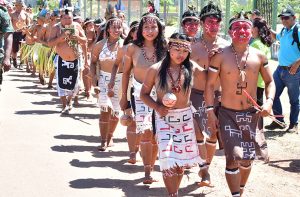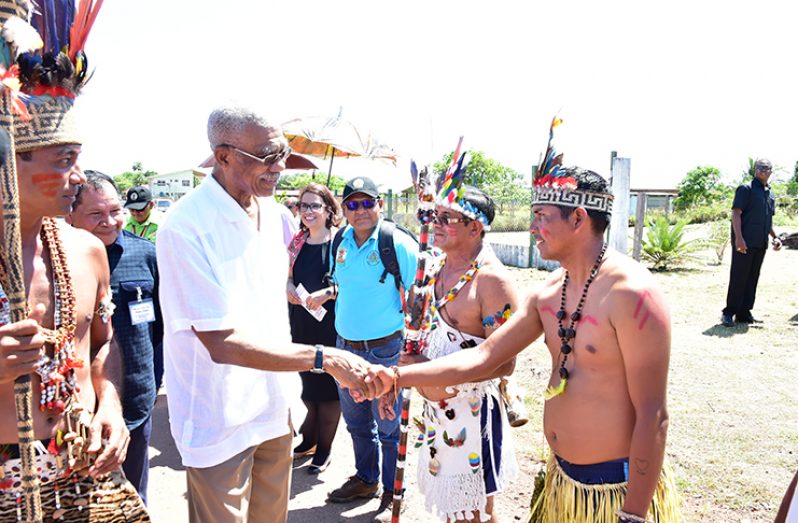…President plugs energy diversification in Rupununi
…tells residents build economy to withstand shocks
AMID this country’s push to becoming a green state, President David Granger on Wednesday told residents of the Rupununi that the generation of solar energy there is very feasible not only for the use at the household level, but throughout the community to power schools and other public facilities.
He made the remarks while addressing villagers at the opening of this year’s Rupununi Regional Heritage celebrations, being held at the St. Ignatius Village Benab. Government has said that a ‘green’ economy is necessary to ensure the sustainable management of the country’s natural resources and assets and help wean it off of its addiction to fossil fuels.
President Granger, himself speaking at the opening of the Green State Development Strategy (GSDS) Multi-Stakeholder Expert Group in November 2017, said that the GSDS is expected to build greater economic resilience by diversifying production, reducing the country’s dependence on fossil fuels, generating renewable energy and emphasise low-carbon manufacturing. “It will add value to production through cleaner, cheaper and renewable energy generation and propose plans to move closer towards the goal of full renewable energy by the year 2025, thereby reducing our exposure to the volatilities of oil markets. The Green State Development Strategy will define the purpose, principles, policies and the processes, which will guide our path towards becoming a ‘green state.’ A better understanding of the need for a strategy requires an appreciation of the rationale behind the ‘green’ state,” he said back then.
On Wednesday, he took this message to the Rupununi, telling residents that energy is an important facet of economic diversification for their communities. He said in order to achieve the ideals set by the people of the Rupununi, there must be access to energy. “In all of this we need energy. We can’t do this without energy. Energy now is becoming more accessible…the amount of sunshine you get from the Rupununi on a daily basis exceeds that in any other part of the country. It means that the use of solar energy is feasible, not just at the household level, but at a community level to power the schools, medical centres and factories,” he stated, according to a release from the Ministry of the Presidency.

“We have to take energy seriously, because once your community could generate sufficient energy, you can start producing mango juice and guava cheese, cashew nut butter [to name a few] that you want to buy in Georgetown. Energy is the key and your leaders must seek sources of energy at any cost, because energy is going to propel the economy,” the Guyanese leader told the audience.
In his address, he also touched on the importance of environmental security, referencing reports made by the South Rupununi District Council (SRDC) on the pollution of the waterways by miners. “Environmental security is very important if we are going to provide for food security,” the President said, noting that every region needs to have an environment policy, so that children would grow up knowing that the environment is their future.
He said poverty must not be taken for granted, while stressing that there is need to reduce poverty. He said too that many persons are still deemed extremely poor and noted that poverty in the Rupununi, as in other parts of the country, can be reduced and ultimately eradicated if villages have economic independence.
Reflect on accomplishments
President Granger also called on the people of the Rupununi to reflect on their accomplishments over the years and look towards enhancing their village economies. He reminded that an economic foundation is key to a prosperous life. “It is the economy which keeps society going…our economic survival is most important. Every society is determined by the way it makes its living. If the quality of life is to improve, hard decisions have to be made”, the President said.
St. Ignatius Village, which sits on Guyana’s border with Brazil has a small population, but President Granger believes that much more can be done to enhance the livelihoods of those who live there. “We in Guyana have to be very careful as we plan our economic survival, not only for this year and this month, but to ensure the long-term survival of our country,” the President said. He called on the people of the Rupununi to build resilience to make Region Nine strong. “Think about how we will build resilience to make this region strong; strong enough to withstand any economic pressure. Strong enough to ensure our children and grandchildren will live better lives than we live and that our parents and grand-parents lived,” the head of state said.
Food security
The head of state also addressed food security, saying that it is one of the most important elements in the economy. “The region has to be food-secure,” President Granger declared, emphasising that to ensure food security there must be the sufficient production of food which can be shared in other areas. “We must not let our products go to waste,” he added. The villages of the Rupununi, he noted, have the capability to move from subsistence farming to sustainable farming because Region Nine, perhaps more than any other region, is susceptible to the vagaries of the weather.
“We have to become more resilient. In a few days’ time, over five dozen members of the Brazilian Construction Engineering Battalion will be coming to this great region to provide some environmental security, so that we have wells during the dry season to provide water to families and livestock and we won’t go from these cycles of excessive water to drought,” said President Granger. The drilling of artesian wells in the villages of Aishalton, Chukrikednau, Shea, Maruranawa, Awaruwaunau, Karaudanawa, Achiwib and Bashraidrun by the Brazilians is set to begin on October 4, 2018.
Unity
Also speaking at the event was Minister of Indigenous Peoples’ Affairs, Mr. Sydney Allicock, who called for greater unity among the people of the Rupununi. He cited unity, respect, management and honesty as a few important characteristics of success. Similarly, Regional Chairman Mr. Brian Allicock noted that it is through unity that progress has been made in Region Nine. Chairman of the National Toshaos’ Council (NTC) and Toshao of Shulinab, Nicholas Fredericks, noted that the heritage celebrations should be seen as a time for reflection on the contributions made by the Indigenous communities towards the building of the nation. He said too that reflections must not be focused only on positive things, but also on areas of improvement. “We should celebrate in a meaningful way,” said the NTC Chair, who called on residents of the Rupununi to work hard to have their various issues resolved. “We have a lot of work to do. We must never be divided; let us work together in unity and celebrate in unity,” he stated. Mr. Fredericks also referenced the need to preserve the cultures of the indigenous peoples.
Minister within the Ministry of Indigenous Peoples’ Affairs, Mrs. Valerie Garrido-Lowe, also spoke at the event before the presentation of a cheque for $1M to the St. Ignatius Village and another for $500,000 to the Regional Democratic Council through Regional Chairman Mr. Brian Allicock. These were presented by President Granger.
A number of footballs were also handed over by President Granger to Toshao of St. Ignatius, Dennis Benedict. Also present at the opening of the Rupununi Regional Heritage celebrations was Minister of Public Affairs, Mrs. Dawn Hastings-Williams; Permanent Secretary of the Ministry of Indigenous Peoples’ Affairs, Mr. Alfred King; and Brazilian Vice-Consul, Ms. Lisa Mary Sousa Dos Reis. The regional heritage celebrations will come to an end on September 29.




.png)









